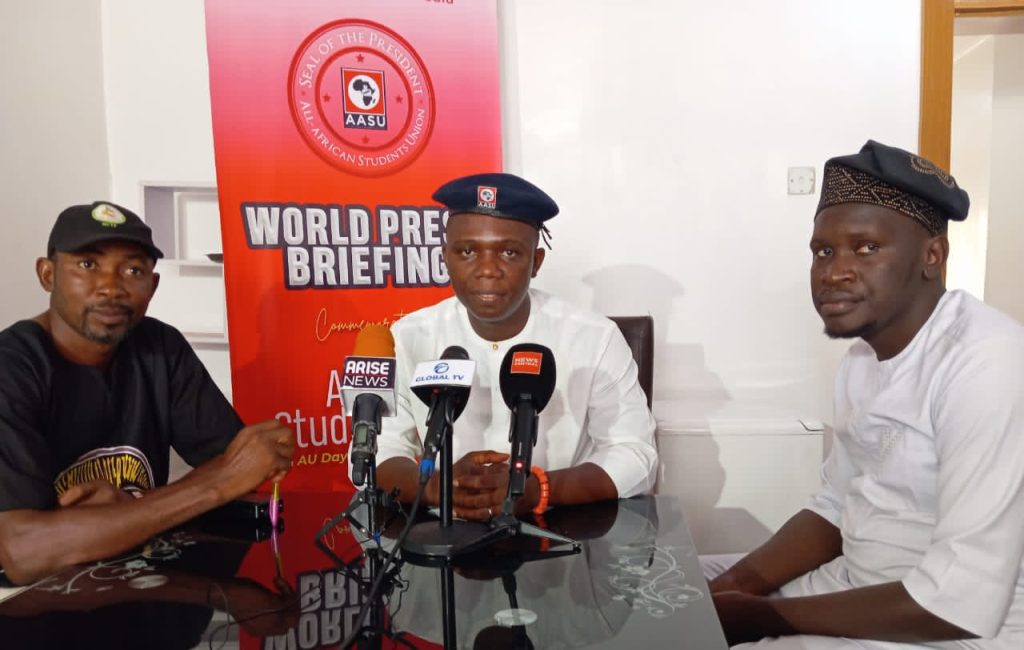The All-Africa Students’ Union (AASU) marked Africa Students’ Day with a commemorative press briefing led by President Osisiogu Osikenyi E. in Abuja.
This event coincides with the International Day of the African Child which honours the legacy of student activists and leaders whose struggles have significantly impacted the continent’s socio-political landscape.
In his address, President Osikenyi acknowledged the historical significance of June 16, which commemorates the 1976 Soweto Uprising in South Africa. “June 16 was declared African Student’s Day at the 6th Ordinary Congress of the All-Africa Students Union (AASU) held in Addis Ababa, Ethiopia in 1982; to commemorate the memories of students who were massacred in Soweto, South Africa, on the 16th day of June 1976,” he stated.

He further highlighted that the protests in Soweto involved around ten thousand black school children who marched against educational injustices under the apartheid regime, demanding to be taught in their own languages, Xhosa and Zulu.
Osikenyi emphasised that “today would be apt to celebrate if every ‘African Child’ is an ‘African Student’,” noting the stark reality that over 100 million African children are currently unable to access education. He urged for significant attention to this issue, aligning with this year’s theme, “Education Fit for the 21st Century.”
Addressing the ongoing challenges, Osikenyi called attention to the pressing issue of campus insecurity and the impact of armed conflicts on education in Africa. He reported that “out-of-school children in Africa has hit over 100 million,” with armed conflicts depriving 28 million of these children of education.
He appealed to more African countries to endorse and respect the Safe Schools Declaration, aimed at protecting students, teachers, and educational institutions during conflicts.
The high cost of education was another critical point, with Osikenyi pointing out that “university students will squeeze out an average of $3000 dollars in 2024,” making education increasingly unaffordable. He praised Nigeria’s introduction of the Students Loan Bill and the establishment of an Education Bank as positive steps.
On the education financing, Osikenyi highlighted the inadequacy of government funding despite Africa’s economic growth, advocating for public-private partnerships to bolster educational financing. He commended the Dangote Group for its substantial contributions to Nigeria’s educational sector, describing it as “the second-largest contributor to Education (after Nigeria’s Government) and the largest private-sector employer in the largest country in Africa.”
Osikenyi also addressed campus insecurity, specifically attacks on educational institutions, urging the African Union (AU) to incorporate campus safety into its peace initiatives.
Furthermore, he condemned the ongoing student rights abuses across the continent, demanding the release of detained student leaders and activists.
The AASU president voiced concerns over the Sudan crisis and the implications for education, calling for an end to hostilities and adherence to the Safe Schools Declaration. He also expressed the union’s rejection of malaria vaccination programs for Africa, advocating instead for funds to be redirected towards combating hunger and improving education.
Finally, Osikenyi called for a comprehensive overhaul of Africa’s education curriculum to better reflect African realities and meet local demands. He expressed felicitations to Muslims across the world on the occasion of Eid-el-Kabir
He also extended gratitude to various African leaders and entities for their support of educational initiatives and student welfare.
Osikenyi expressed appreciation for the solidarity and contributions of student leaders across Africa, encouraging continued advocacy for student rights and education reforms. “Dare to struggle; Dare to win,” he urged, ending the briefing with thanks to the press and all attendees.


